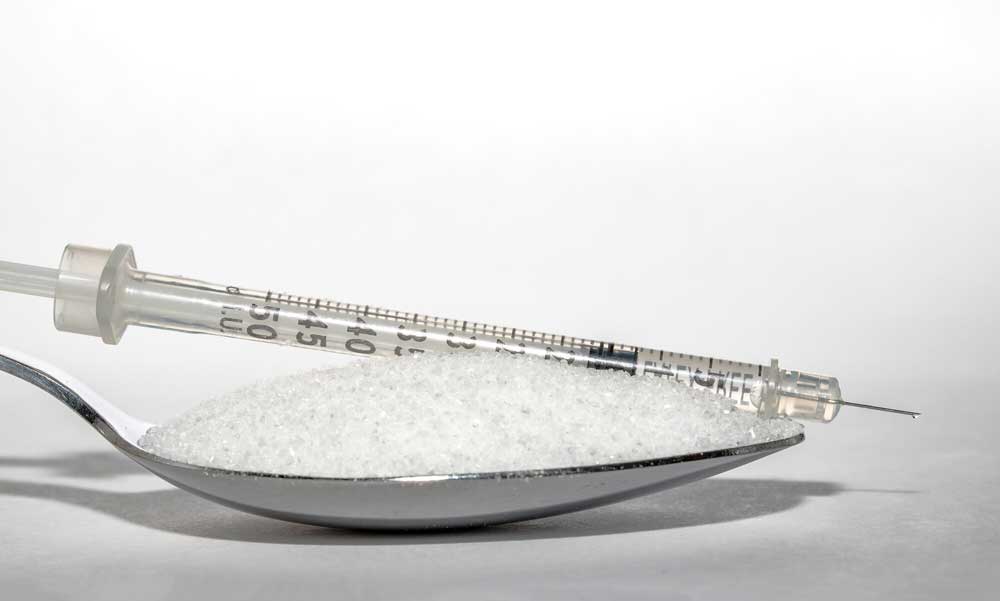
by Ingredia USA | Jul 7, 2022 | Blood Sugar Management
We’ve all heard the advice that drinking 8 glasses of water per day is good for our health. However, most of us struggle to drink the recommended amount each day. According to one study, less than 25% of Americans partake in 8 glasses a day.
For those living with diabetes, proper water intake is even more crucial. Why is this? In this article, we’ll explore the link between water and blood sugar, and how important it is to stay properly hydrated.
Benefits of Water
To begin, let’s look at the benefits that water brings to our bodies. The principal chemical component present in our bodies is, you guessed it, water. Our bodies require water to function properly, not to mention survive altogether. Everything within our bodies relies on water to operate: tissues, joints, body temperature, and even waste removal.
We lose water constantly throughout the day via things like exercise or environmental factors. Lack of water leads to dehydration, which eventually causes our normal functions to operate at inefficient levels. Not drinking enough water can lead to things like lack of energy and brain fog.
By drinking enough water, we replenish our system, thus allowing our body and brain to function at optimal levels.
Water and Blood Sugar
For those with diabetes or anyone trying to prevent it, proper water intake is especially crucial. Water helps control blood glucose levels, and for people living with diabetes or those that are trying to prevent diabetes, blood sugar management is of utmost importance. So, how does water reduce blood sugar?
A diabetic body isn’t able to utilize glucose correctly to turn it into energy. This leads to a buildup of sugar in the bloodstream. IIf there are excess levels of glucose within the bloodstream, and not enough water to flush it out, the body may borrow from other areas like tears or saliva. If access to other areas is limited, that extra glucose will continue to build up, leading to dehydration.
In short, water helps flush out glucose located in the blood. This helps maintain healthy blood sugar levels due to the dilution of the built-up concentration of glucose.
Lack of Water
At the point where a body begins to borrow from other areas like the eyes or muscle tissue for hydration, the kidneys have already been working overtime. A lack of hydration will cause the kidneys to retain fluid, as well as hang onto unwanted glucose.
This sort of strain wreaks havoc not only on blood sugar levels but the health of your body as a whole. However, proper hydration can help.
Hydration is Key
We know that hydration is of utmost importance but you may be asking yourself the question ‘how much water should I drink?’
Your water intake levels may vary depending on your lifestyle. For example, if you’re a highly active person, your body may require more water to rehydrate to optimal levels. Maybe you’re someone who lives in an extremely arid climate. If so, you might also require a few extra glasses per day.
Each body’s needs will vary and hydration levels should truly be individualized. However, a good daily rule of thumb is to drink anywhere from 4 to 6 cups per day.
Bonus Options
Drinking plain glasses of water throughout the day can feel boring and downright hard to do sometimes. However, there are other options available to you in order to stay hydrated and keep blood sugar levels under control.
You can implement utilizing an online app to track your water consumption and set reminders. Or try habit stacking by drinking your water alongside everyday tasks. Getting up to check your phone? Drink some water. Getting up to make a snack? Drink some water. Taking your daily vitamins? Drink a full glass of water. Make it easy for yourself to get those glasses in.
If you struggle with plain water, try infusing your water with natural flavors. You can use fruits like lemons, limes, or strawberries to naturally sweeten it. Using herbs such as mint or basil can also add a refreshing layer, making it easier to get those glasses in throughout the day.
In addition to tricking your brain into remembering to drink water, there are products made to specifically help regulate blood sugar levels.
Food Innovation
Apart from merely drinking enough water to stay hydrated and ensuring glucose is properly flushed out of the blood, proper diet habits should be noted as well.
Companies such as Ingredia offer future-thinking foods meant to improve overall health via innovative dairy technology. A healthy lifestyle paired with proper hydration is key to the management of blood sugar levels. One particular functional food option that Ingredia offers is specifically meant to manage blood sugar levels.
Offered in the form of a digestive enzyme, Pep2Dia, a health ingredient with an active dipeptide AP, is designed to inhibit the alpha-glucosidase enzyme. This inhibition is what enables the regulation of blood sugar levels within the body. It is meant to be taken prior to a meal as a measure of prevention.
Balanced blood sugar levels mean our bodies are able to regulate glucose in a normal amount of time. Options like Pep2Dia are there to assist with that process.
Drink Your Water
Water and blood sugar levels are highly interconnected. When we properly feed and hydrate our bodies, we lessen our chances of both dehydration and diabetes among many other things. By maintaining proper water intake, you can keep potential dehydration at bay as well as reduce your chances of a prediabetes diagnosis.If you’re interested in learning about additional ways to help regulate your own blood sugar levels, check out Ingredia’s products here. Don’t hesitate to get your health on track today!

by Ingredia USA | Jun 1, 2022 | Stress Management & Sleep Disorders
If you’re feeling tired, can’t concentrate, or just can’t seem to lose that pesky belly fat, you may want to check your cortisol levels.
Cortisol is a hormone that is key to the body’s stress response. While a little cortisol is beneficial—even essential—as a motivator and energy booster, too much of it can be detrimental to your health.
Keep reading to learn more about the relationship between cortisol and weight gain, so you can better manage your weight and have a healthier lifestyle.
What is Cortisol?
Cortisol is one of the main stress hormones the body releases when faced with a stressor.
Back in the days of hunter-gatherers, these stressors typically consisted of wild animals and other similar dangers. Cortisol would give a boost of speed, focus, and strength to help overcome these dangers. This is what we know as our fight-or-flight response.
What Causes Abnormal Cortisol Levels
In modern times, the body reacts in the same way to the consistent barrage of stressors found in most people’s packed schedules. These include:
- Constant email and text notifications
- Rush-hour traffic
- Work schedule change
- Mental or physical overworking
- Financial concerns
- Medical issues
- Overexercising
- Too much caffeine
- Too much sugar and carbohydrates
- Too little sleep
- Frequently skipping or delaying meals
The issue is a person’s body cannot tell the difference between actual danger and a stressor. That is why a person’s body may react the same way to giving a presentation at work as it would to getting attacked by a wild animal.
Cortisol and the Sleep Cycle
The release of cortisol is closely related to the body’s circadian rhythm.
Within the first 30 to 40 minutes of waking up, about half of your daily cortisol is released by your body. It then gradually falls throughout the day under the control of the pituitary gland and hypothalamus.
Ideally, a person’s cortisol levels will be lowest around midnight, but this is unlikely to occur if they are still awake. For this reason, many recommend going to sleep before midnight and getting around seven to nine hours of sleep per night.
The Connection Between Cortisol and Weight Gain
Of all the stress hormones, cortisol and weight gain are especially linked.
The body has more cortisol receptors in the abdominal tissue than other areas of fat storage. Because of this, cortisol acts more on our fat cells in this area.
Blood Sugar Levels
To increase energy during the body’s fight-or-flight response, cortisol temporarily boosts blood sugar levels.
This rise in blood sugar levels is quickly followed by a drop that leaves people tired, hungry, stressed, and craving sugar and salt.
In this state, a person is more likely to reach for sweet, unhealthy snacks than balanced, high-protein foods. This can lead to a vicious cycle, as unhealthy snacks like donuts and cookies will just lead to another sudden rise and drop in blood sugar levels.
Plus, the increase in blood sugar levels also increases the body’s resistance to insulin. The higher the body’s insulin resistance is, the more likely it is for blood sugar to go up, weight gain to occur, and Type 2 Diabetes to develop.
Thyroid Function
Cortisol levels also impact the thyroid, a gland that helps maintain a healthy metabolism.
An impaired thyroid can cause weight gain and low metabolism symptoms, such as fatigue and feelings of depression. Other symptoms of a low metabolism include feeling cold, memory problems, and poor concentration.
Managing High Cortisol Levels and Weight Gain
To fight back against the effect cortisol can have on your body, it is important to keep your blood sugar levels balanced. Doing so will help prevent the sudden hunger and sugar cravings that come with a quick drop in blood sugar.
To keep your blood sugar steady, it is important to eat a balanced mix of protein, beneficial carbs, and healthy fats.
Lean meats, eggs, and dairy are some quality sources of protein that will help break down amino acids and encourage the production of serotonin and dopamine. These “feel-good” neurotransmitters help combat stress hormones and weight gain.
While fats are considered taboo among many trying to lose weight, the human body needs a certain amount to function properly. Nonsaturated fats can help us think better and encourage a better mood without clogging the arteries.
Another alternative to consider is adding a dietary supplement, such as Pep2Dia to your diet. It can help control blood sugar levels and lower the post-meal glycemic peak.
Exercise
Regular exercise can help reduce stress levels and increase a person’s resilience when faced with a stressor.
Exercise is known to increase the level of endorphins in the body. Like serotonin and dopamine, endorphins are “feel-good” neurotransmitters that can help combat high cortisol levels and weight gain.
Plus, exercise burns calories which can also help with weight loss and weight management.
Getting More Sleep
As mentioned earlier, sleep and cortisol levels are connected.
Not getting enough sleep can have a negative impact on your metabolism and increase hormone levels associated with hunger and appetite.
The recommended amount of sleep per night is generally seven to nine hours, but this can vary by a range of factors, including age, health, and typical physical and mental activities.
If you are struggling with falling asleep, a supplement such as Lactium may also help.
Managing Weight Gain
The relationship between cortisol and weight gain should not be ignored.
Taking steps to lower your cortisol levels can boost your metabolism, decrease your feelings of hunger, and help prevent fat in your abdominal tissues. By improving your diet, exercise levels, and sleep schedule, you can reduce your cortisol levels and boost your overall health.Contact us today if you want to learn more about managing stress and living a healthier lifestyle.

by Ingredia USA | May 2, 2022 | Blood Sugar Management, Stress Management & Sleep Disorders
Did you know that more than 34 million Americans have been diagnosed with diabetes? Of those 34 million, 90 to 95 percent have type two diabetes.
Maybe you knew that, but did you know there is a connection between stress and diabetes? If you’re stressing out and have diabetes or prediabetes, how does that impact you?
The answer to that question is something you need to know. Keep reading to find out more about stress and your blood sugar.
How Are Stress and Diabetes Connected?
Stress and diabetes are connected in more than one way. Your diabetes can cause stress, and your stress can increase your blood sugar levels.
Stress Caused by Diabetes
Whether your diagnosis is new or old, managing diabetes can get stressful very quickly. Making sure you are managing your sugar, meal planning, and other aspects can feel like they take over your life.
This can lead to a lot of stress. You may also worry about dips or rises in your blood sugar that could impact your ability to function.
There’s nothing worse than stressing about your health; however, managing a condition such as diabetes can take stress to a new level.
The Impact of Stress on Diabetes
Whether your stress is about your diabetes or something else in your life, your stress, in turn, can impact your diabetes. Stress can impact you whether you have type 1 or type 2 diabetes.
When it comes to stress and type 1 diabetes, what you will often see is that these individuals can experience an increase or decrease in their glucose levels.
However, when it comes to stress and type 2 diabetes, they generally experience an increase in their blood glucose levels.
Why Does Stress Impact Blood Glucose Levels?
Have you heard of fight or flight? Our bodies are conditioned to respond when we place stress on them. It’s a survival instinct.
Fight or flight is triggered by the hormone cortisol. Cortisol is a good hormone, but higher levels can have a negative impact on your health.
Stress activates the sympathetic nervous system and the hypothalamic-pituitary-adrenal axis. Because of that, it causes hormonal changes.
This includes a higher cortisol level and a lower level of sex hormones. Both of these hormones affect your body’s insulin levels.
That’s the science behind why stress impacts diabetes. However, it can even be as simple as stress eating.
When stressed, you might be more likely to reach for carbs and fatty foods that send your blood sugar soaring. On the other side of things, you might not want to eat. You might struggle to manage because you’re not eating.
What’s the Solution?
When it comes to diabetes, managing stress is imperative. If you don’t manage your stress, you will notice that you are struggling to manage your diabetes.
There are many stress management techniques you can utilize to help you.
Educate Yourself and Find Support
If you don’t know a lot about diabetes, it’s scary. The best way to manage the fear of the unknown is by turning it into the known.
Use various resources to learn about your condition. Make lists of questions and talk to your doctor about them. Do whatever it takes to understand your condition.
You can also find support groups. This will help you have somewhere that you can talk to others that understand your experience. There are even virtual support groups available.
Educate the People Around You
Sometimes your stress can come from the people around you. If they’re constantly hovering and worrying, it can add a layer of stress.
Take the time to educate them on what your diabetes means and how they can help you. This allows them the opportunity to support you in a way that works for both of you.
Educating the people around you also helps them with the fear of the unknown.
Make a Meal Plan
As you educate yourself, educate yourself about the foods you should be eating and make a plan. Planning meals and snacks will help you navigate busy days.
You can even take a day to meal prep. Consider including Ingredia’s Pep2Dia® as part of your meal plan too. Many foods can help you regulate your blood sugar, research them, and add them to your diet.
If you’re worried about making your own meal plan, work with a nutritionist.
Try Mindfulness
Mindfulness is a great way to manage your stress. Try mindfulness stress management techniques and learn how to incorporate it into your daily life.
Mindfulness helps you be more aware of the needs of your body. It also helps to reduce stress.
Organize Your Medication
If your diabetes management feels chaotic, it probably is, and that will cause another level of stress. Organize your medication and supplies.
However, this isn’t just about making them pretty and organized. This aspect is also about taking the time to set up a schedule.
Set alarms for when you need to check your blood sugar and take your medication and even eat. Make sure whether you’re on the go or at home, you have the supplies you need at hand and are easy to grab.
Use Your Healthcare Team
Talk to your doctor, talk to a nutritionist, or talk to whoever on your healthcare team you feel can help you. They’re great resources for how to manage diabetes and how to still live your life to the fullest.
Practice Self-Care
Everyone needs to practice self-care. However, it’s even more important when you have diabetes.
Self-care can help you feel more at ease and calm. When life feels chaotic and crazy, self-care gives you the opportunity to take a step back and breathe.
Self-care can often feel like a guilty pleasure, but in reality it’s a necessity.
Manage Your Stress and Diabetes
Managing stress and diabetes is essential to a healthy life. Take the time to learn how to manage both so you can be a healthier you.
Are you looking for more ways to manage your stress or diabetes? Check out our blog for more stress and blood sugar management articles.

by Ingredia USA | Apr 4, 2022 | Pet Health
If you’ve ever had a household pet, you know that these furry friends quickly become special members of the family. You care for them and spoil them as if they were one of your children, and the home wouldn’t be the same without them.
However, life is full of change, and new life events may cause some pet stress for you and your family. Whether it’s moving to a new home or welcoming a new baby to the family, it’s an adjustment for everyone.
Regardless of the occasion, moving with pets or having dogs and babies together in the house for the first time can be stressful. Don’t worry too much, though, because there are ways to make the transition easier for everyone.
These life events should be exciting. The stressful little things shouldn’t keep you from enjoying these milestone moments. If you have an upcoming move or a baby on the way, keep reading for some tips on dealing with pet stress.
Tips for Moving with Pets
Whether this is your first time moving with a pet or your pet has traveled with you numerous times, the moving process becomes extra complicated with pets.
Because dogs and other pets are not used to new environments and do not process them the same way humans do, this new change can be very stressful for them.
Keep Their Favorite Items Handy
One thing you can do to make the transition a little bit easier is keep a bag on hand with essentials for your pet. Having items available that the pet is used to and enjoys can keep them occupied and make the new environment feel a little more comfortable.
Some good ideas of things to include are favorite toys, treats, and food and water. Think of your pet’s favorite comfort items, and just be sure that they’re easily accessible during the chaos of the move.
Make them Feel at Home
It’s also helpful to set up the pet’s area as soon as possible so they have a designated spot that makes them feel at home.
You don’t have to keep this area for them permanently, but giving them a designated spot during the move is helpful. Pets love routine and comfort, so the key is to give them as much of a sense of normalcy as possible.
The first night in the new house or even the first few nights may be difficult as everyone gets settled, but patience is key. Remember that you and your other family members are the only familiar thing about this new environment for them.
You can comfort your pets by giving them plenty of attention and care and staying home as much as possible within the first few days of the move. Even if this means just taking the dog for a walk around the block a few times a week or giving them some belly rubs, these little acts of love can help relieve stress for the pet–and for you too!
Pets and Babies
Bringing a new baby home can be one of the most beautiful and exciting moments in a growing family’s life. However, having pets and newborns under one roof can certainly be overwhelming and stressful at first.
Just like moving into a new home, bringing a new family member home is a huge change in routine for your pets. But, again, you can plan ahead to make the transition a little bit smoother for everyone.
You may be worried about how the pet will react to this new baby, especially if you consider your pet to be your “first baby”. Your pet is likely going to be overwhelmed with all of the new lifestyle changes that come with a new member of the family, especially if this is their first time interacting with a child, specifically a newborn baby.
Introduce Your Pet to New Changes
Before the baby even comes, there may be significant lifestyle changes happening at home. You can prepare your pet by helping them adjust to these changes during this period. Some helpful ideas might be introducing them to new smells such as baby lotion or baby powder, or even playing baby sounds on a speaker around the house.
The more you can introduce to your pet before the baby arrives, the better the transition will be. If the pet is becoming prepared before the chaos of the new baby, they will be less stressed and overwhelmed when you return home.
Give Them Plenty of Attention
Another big change is that you may not be able to give your pet as much attention as before. It’s very important to prepare your pets for this beforehand so that they don’t feel suddenly neglected.
A good way to prepare them for this change is by spending quality time with them beforehand, like going for long walks or setting aside playtime. Be sure to create a routine with these activities that you can keep up with once the baby comes.
Bringing the Baby Home
When it’s time to bring the baby home, it might be a good idea to let everyone else go into the house first before you bring the baby in. Dogs especially tend to be a bit rowdier when everyone first arrives back home, so this will allow them to get all of that energy and excitement out first.
Once the pet has calmed down, calmly enter your home with the baby. A dog can sense if you are nervous or tense, so try your best to stay as calm as possible.
When you’re ready for the pet and baby to meet, be sure that you’re present and alert during these interactions. Pets can be unpredictable especially around new people, so it’s important that you’re there to keep everyone safe.
If you follow these tips, you might notice your baby and pet become the best of friends in no time!
Relieving Pet Stress: Caring for Yourself
Changes in life can always be stressful, and pets can certainly make these transitions a little bit more complicated. We know how important your pets and other family members are to you, but you deserve to take care of yourself, too.
Be sure that you have coping skills in place to manage your own stress. Not only can pets and babies sense if you’re stressed or tense, but you also deserve to fully enjoy these special moments with your family.
If you’re looking for more guidance on how to manage pet stress and baby stress during these life-changing transitions, visit our website for natural stress-relieving supplements you can implement in your daily routine.
We hope that we can help you relish in the beauty of these special life milestones and cherish every moment.
Contact us

by Ingredia USA | Apr 1, 2022 | Pet Health
Separation anxiety is one of the more common behavioral issues you may have to deal with when raising a dog.
It affects every four to six dogs and is a serious condition that causes ongoing distress when you are gone. They chew off furniture, claw at the floor, and continuously bark when you aren’t at home.
The good news is that there are ways to help your dog cope better. This post looks at eight ways to help with separation anxiety in dogs.
Signs of Separation Anxiety in Dogs
Different dogs may exhibit different signs of separation anxiety. Some of the common ones include:
- Anxious pacing, whining, or trembling as you prepare to leave the house and after you’re gone
- Destructive behavior like digging or chewing around windows and doors
- Desperate and continued attempts to escape confinement, which could result in serious injury
- Excessive barking and howling
- Excessive drooling, salivating, and panting
If possible, take time to film your dog when you notice these potential issues. It’ll come in handy when you decide to involve an expert.
How to Treat Separation Anxiety in Dogs
Treatment for separation anxiety is necessary because it makes your dog calm and happier. There are several effective ways to manage separation anxiety in dogs.
Exercise Your Dog Before Leaving the House
Many dogs, particularly ones suffering from separation anxiety, can benefit from regular exercise. Start your day by taking your furry friend for a walk to exercise their body. If you have a large, high-energy dog, you can use a dog backpack with extra weight to make the walk more rigorous.
Mental exercise is just as important for treating separation anxiety in dogs. Consider investing in cognitive games, puzzle toys, and training sessions. They will leave your dog exhausted and ready for a rest.
In addition, a tired dog who’s had brisk playtime and exercise before you leave will be more likely to relax when the house is empty.
Avoid Punishing Your Dog
Separation anxiety in dogs often manifests destructive behavior such as clawing on upholstery. What you do when you come home can either make the behavior worse or calm your dog.
You must not punish or yell at your dog if you come home to a mess. Rather than let the dog see your annoyance, let them outside and then clean as they play in the yard.
Telling your dog off will only cause it to lower its head, pin its ears backward, and put its tail between the legs. The dog won’t associate your irritation with their earlier behavior. As a result, the anxiety will worsen the next time you leave the house.
Desensitization and Counter-Training
An important aspect of raising a mentally healthy dog is teaching them to form positive associations with every experience. This helps them be comfortable in the world, even when you aren’t around.
You can start the desensitization process by leaving your pup for short periods. Then, gradually lengthen the amount of time you’re out of the house.
Try combining this with high-value treats. Your dog might look forward to your departure if you give him a special treat every time before leaving the house.
You can also desensitize your dog by making your departure less distressing on them. For instance, try tossing a tasty treat before grabbing your coat.
If going out in the evening, pick up the keys then make dinner rather than going straight to the car. Your dog will learn not to panic when you are about to leave with time.
Leave Your Dog With Interactive Toys
If you are gone for more than six hours, interactive toys can prove helpful. A toy stuffed with food or treats will keep your pup busy when you’re gone.
However, we must caution against using this tactic with dogs suffering from severe separation anxiety. The dog might take the food as a cue that something bad is about to happen, especially if you toss them a treat before leaving. They’ll panic when the food is consumed and realize you still haven’t returned home.
Don’t Encourage Clingy Behavior
Clinginess can make exacerbate the symptoms of pet separation anxiety. However, encouraging a sense of independence has the opposite effect. You can start by leaving your dog in another room even when you’re at home.
At first, leave the room for short periods and play it cool when you return. Eventually, the dog should be able to remain calm even when you’re out of sight.
When you get home from work, keep things calm and avoid fanfare. Even when he’s done some damage, getting worked up will only worry your pup unnecessarily.
Use a Sitter
Dogs suffering from severe separation anxiety may start feeling anxious mere minutes after you leave the house.
If that’s the case, a sitting service may prove useful for treating separation anxiety in dogs. This is particularly helpful if you’re not home for more than four hours a day.
You can rest assured that someone will keep your dog company, so they aren’t alone when you use a sitting service. They even take your dog for walks to dispense of the excess energy. In addition, the sitter will help your furry ease any stress they may feel in your absence.
Comfort Items May Help
Things with your scent, such as dirty laundry, can comfort your dog until you get back home. However, you must also eliminate stress factors like collars, crates, chains, and chokers.
You can also hide treats around the house so the dog can hunt for them – like a treasure hunt. Last but not least, soothing nature sounds can prove a comforting item to help your dog relax and sleep.
Prescription Medication
Medication can help ease the symptoms of separation anxiety when your dog harms itself or other animals due to anxiety. Anxiolytic drugs reduce anxiety and are often used long-term. It takes four to six weeks to take effect. Additionally, using this medication requires annual medication.
Event-specific medications are used when a trigger is going to occur. You can use them alongside desensitization training to reduce anxiety and allow positive experiences in your absence. Be sure to consult your vet before using any anti-anxiety medication to treat separation anxiety in dogs.
Treating Separation Anxiety in Dogs One Step at a Time
Effective treatment can feel challenging when you don’t know how to deal with separation anxiety in dogs. However, with patience, determination, and the above tips, you may be able to end your pup’s suffering.
Contact us today to discover more information and research to help your pup live a healthier life.





